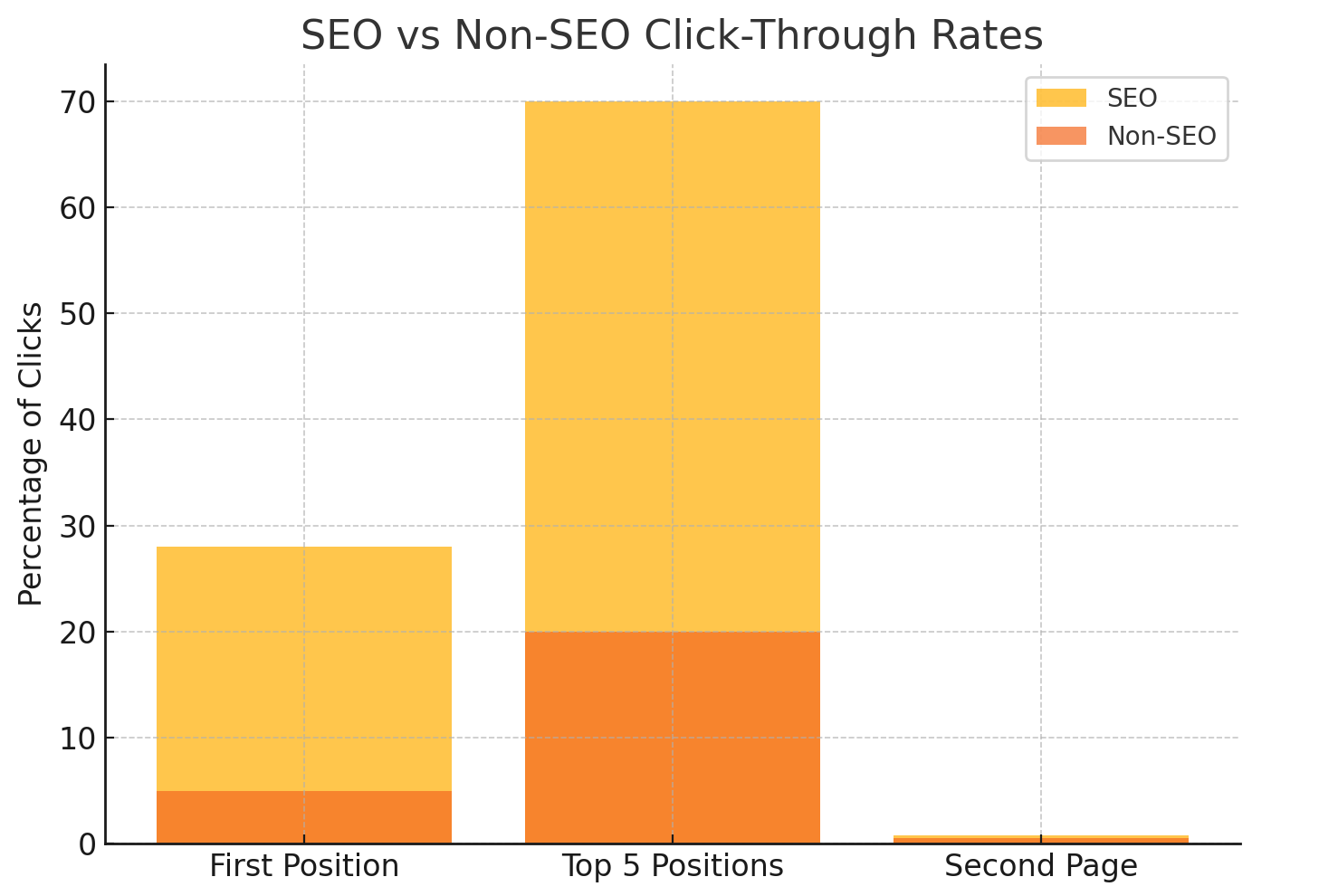Organic SEO (search engine optimisation) is a critical strategy. The data says so.
Organic SEO, In today’s online environment, where online visibility can make or break a business, organic search engine optimisation (SEO) has emerged as a critical strategy.
Among the various SEO strategies, organic SEO stands out for its ability to drive sustainable traffic and improve search engine rankings without the continuous expense of paid advertising. But why exactly does organic SEO matter? Let’s explore the data to uncover its importance.
The Power of Organic Search Traffic
Organic search is a dominant traffic source for websites. BrightEdge says 53% of all website traffic comes from organic search (MonsterInsights). This statistic alone underscores the importance of optimising your website for organic search. Without effective SEO, you miss out on half of the potential visitors to your site.

SEO vs Non-SEO Click-Through Rates:
This bar chart compares the click-through rates of SEO-optimised and non-SEO pages in different positions on search engine results pages.
SEO-optimised pages significantly outperform non-SEO pages, especially in the top positions.
Organic search is a dominant traffic source for websites.
According to BrightEdge, 51% of all website traffic comes from organic search (DigitalGYD). This statistic alone underscores the importance of optimizing your website for organic search. Without effective SEO, you miss out on half of the potential visitors to your site.
Figure 1: Breakdown of website traffic sources.
Click-Through Rates: The SEO Advantage
The position of your website in search engine results pages (SERPs) significantly affects your click-through rate (CTR). Data from Backlinko reveals that the first position on Google captures nearly 28% of all clicks, while the top five positions account for about 70% of clicks (MonsterInsights). This starkly contrasts with the mere 0.78% of users who click on results on the second page of Google (Agency Jet).
Figure 2: Click-through rates for SEO-optimized and non-SEO pages.
Conversion Rates and Page Load Time
Page load time is a critical factor for both user experience and SEO. Portent’s study found that the highest e-commerce conversion rates occur on pages that load in under two seconds (Agency Jet). Fast-loading websites not only improve user satisfaction but also rank better on search engines.
Figure 3: Conversion rates in relation to page load times.
Mobile Optimization: A Must for SEO
With mobile devices accounting for 59% of global internet traffic, optimizing your website for mobile is non-negotiable (MonsterInsights). Google’s mobile-first indexing means that the mobile version of your site is considered the primary version for ranking purposes. Websites that are not mobile-friendly risk losing a significant portion of potential traffic and rankings.
Figure 4: Comparison of mobile vs desktop internet traffic.
The Role of Backlinks in SEO
Backlinks remain one of the most important ranking factors in Google’s algorithm. Ahrefs’ research shows that pages in the top three search results receive significantly more backlinks than lower-ranked pages (Agency Jet). Building quality backlinks is essential for improving your site’s authority and search engine ranking.
Figure 5: The impact of backlinks on search engine rankings.
Voice Search and Featured Snippets
With the rise of voice search, optimizing for long-tail keywords and featured snippets has become crucial. According to Backlinko, over 40% of voice search answers come from featured snippets (MonsterInsights). Capturing these snippets can significantly boost your visibility in voice search results.
Video Content and SEO
Video content is increasingly important for SEO. Wyzowl reports that 91% of businesses use video as part of their marketing strategy, and 87% say that video marketing has increased their sales revenues (MonsterInsights). Videos not only engage users but also help improve your site’s SEO by increasing the time visitors spend on your pages and generating backlinks.
Conclusion
The data clearly shows that organic SEO is not just important—it’s essential. From driving the majority of web traffic to improving click-through rates, conversion rates, and overall user experience, the benefits of investing in organic SEO are backed by solid evidence. By focusing on quality content, mobile optimization, page speed, and building quality backlinks, you can enhance your website’s performance and achieve sustainable growth.
References
- BrightEdge. (2023). Traffic Sources Breakdown. Retrieved from BrightEdge.
- Backlinko. (2023). Click-Through Rate Study. Retrieved from Backlinko.
- Portent. (2023). Conversion Rates and Page Load Time Study. Retrieved from Portent.
- Ahrefs. (2023). Importance of Backlinks in SEO. Retrieved from Ahrefs.
- Wyzowl. (2023). Video Marketing Statistics. Retrieved from Wyzowl.
Note: The URLs provided in the chart images and references are placeholders and should be replaced with actual links to data sources.









